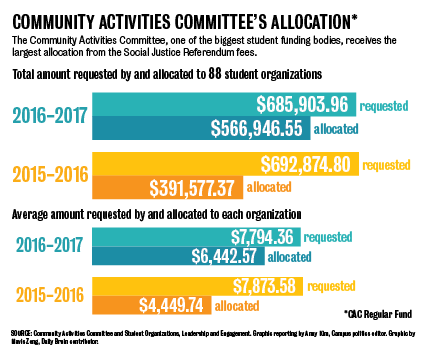SJR enables student funding committee CAC to better allocate resources

By Yun Kyung (Anny) Kim
June 11, 2017 2:22 p.m.
One of the largest student funding bodies on campus has seen a significant improvement in fund allocations after budget increases.
The Community Activities Committee allocated more than $550,000 to student groups in this year’s regular funding cycle, which is about 44 percent more than last year. The committee received more funding from the Social Justice Referendum and a supplementary fund from the Student Fee Advisory Committee, said Joshua Sarna, CAC chair and a fourth-year chemistry student.
SFAC is a student-majority committee that gives recommendations to Chancellor Gene Block on how some funds from the Student Services Fee should be used.
“CAC received a one-time bailout from SFAC, so this year we had an extra source of money that rolled over from 2015,” Sarna said. “We had more money coming into this year, and knew we would be getting more during the year through the Social Justice Referendum.”
The referendum, which passed in the 2016 undergraduate student government elections, increased undergraduate student fees by $24.99 per quarter to support social justice programs and services. CAC receives the largest allocation of the referendum fees to accommodate increased demand from student groups for funding.
CAC provides funds for student organizations that serve disadvantaged communities off campus.
Eligible groups can apply yearly for a maximum of $10,000 from the committee’s Regular Fund to finance services for the whole academic year. They can also reapply for smaller amounts from the committee’s Mini Funds and Summer Funds to support ongoing programs.
A total of 88 student groups applied for this year’s Regular Fund and the CAC allocated 82 percent of the total requested amount. Last year, the committee received the same number of applicants but was only able to fund 56 percent of the requested total.
[Related: Student groups express disappointment after receiving less funds than they requested]
The total CAC budget for this year was $1,037,769, a 41 percent increase from last year’s $734,045.
“We were definitely able to budget more funding allocations this year because there was more budgeted money than the total requested,” Sarna said “CAC had the freedom to consider each application without ranking them against one another.”
Sarna said the committee ranks funding applications based on specific criteria, such as the structure and cost-efficiency of the organization, when deciding whether a group will receive full funding.
However, CAC has amended the Mini Fund allocation process to provide full funding for every application that is strong and justifies each expense it is requesting, Sarna said.
“When applications are ranked, there’s only one top-ranked application, so only one group has the potential to get fully-funded,” Sarna said. “(Now) we’re able to fully fund more groups.”
Ira Santos, president of the Pilipinos for Community Health and a fourth-year biology student, said her club would have been eligible to receive the entire requested amount if they had specified a budget item on the application.
Leaders of several student organizations said they were pleased with this year’s CAC allocations.
Matthew Nguyen, president of Building Engineers and Mentors, and a fourth-year aerospace engineering student, said his organization received a greater percentage of the requested amount this year than during prior years.
BEAM applied for $3,333 this year and it received $2,800, which is higher than the 41 percent it received last year.
Grant Colin, funding director for YOUTHphonics A Cappella and a third-year economics student, aid his organization received 91 percent of its requested total, in contrast with the 85 percent it received last year.
“We were definitely satisfied with our CAC allocations this year,” Colin said. “We received more than past years.”
However, not all student groups were pleased with the allocations they received.
Karen Vo, finance director of Vietnamese Community Health and a second-year biochemistry student, said she thinks the group was thorough with its application but only received $200 more than last year.
“We requested the full $10,000 and got $8,500,” Vo said. “I don’t think it (CAC allocations) improved that much compared to previous years.”
Sarna said he thinks allocation decisions will become easier because of budget increases from SJR’s quarterly fees.
“Our budget should be bigger next year, because the SJR fees only started coming to us at the end of the winter quarter,” Sarna said.
Sarna added that the projected budget for next year and onwards will be about $1,151,000, and may change as the student population increases.

